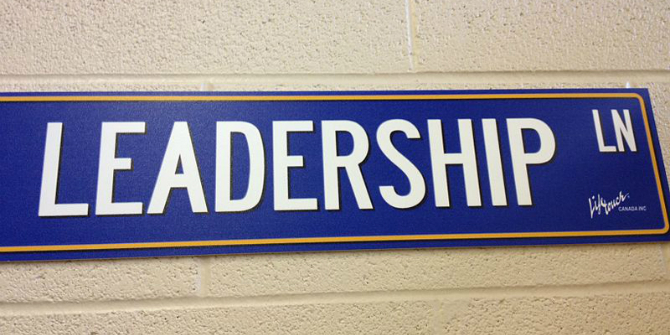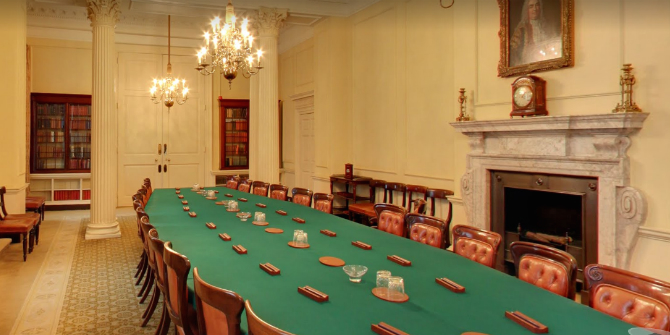 So far, Brexit has not been leadership’s finest hour. Indeed effective leadership could be considered AWOL. Arguably, it has never been more required since the darkest hours of the Second World War. Brexit will become a leadership case study in years to come. In this article, Steve Kempster examines leadership as a narrative through Brexit in three stages: what happened leading up to the referendum; what has occurred since; and what will be required after we leave the EU.
So far, Brexit has not been leadership’s finest hour. Indeed effective leadership could be considered AWOL. Arguably, it has never been more required since the darkest hours of the Second World War. Brexit will become a leadership case study in years to come. In this article, Steve Kempster examines leadership as a narrative through Brexit in three stages: what happened leading up to the referendum; what has occurred since; and what will be required after we leave the EU.
Where was leadership during the referendum?
This was for sure not David Cameron’s finest hour. Indeed, for the Remain camp, it was hard to identify leadership that was effective. Commentators and researchers on effective leadership agree that leadership is a process of influence, a process to shape sense-making of what is happening, and a process to stimulate action. Effective leadership seeks to do these things through an evocative and desirable narrative. For the Remain leadership camp, the narrative was there – the economic problems that would occur if Brexit happened. The approach was to bombard voters with detail and data. There was no exciting or desirable future being described in a narrative. Nothing was offered about a world to come in the EU that would get the pulse up and the heart pumping.
Contrast that with the Leave camp. Very quickly, the Leave camp shaped sense making of Remain facts as a narrative of ‘project fear’. Aligning the Leave narrative with the NHS – and how the funds for the EU could be diverted to rescue the NHS – had great appeal. I would suggest the facts of the amount of money were not the central point. It was a romantic narrative that spoke to a desire for control, for a future that would be better, and for hope. Not for the first time (and certainly not the last time), we ‘don’t let facts get in the way of a good story’. And, what was the Leave camp’s finest hour? The last comment on Brexit was at the end of a rather tiresome points draw of a debate. Boris Johnson was able to have the final word: ‘When we vote leave and take back control, I believe leave this Thursday can be our country’s Independence Day’. An epic form of narrative – a chance for freedom from the enslaving EU…
It seems plausible to me that with polls so tight that the floating undecided might be captured by such a narrative and a 2% swing might lead to a 52-48% outcome.

What has occurred since?
The context and the complexity of the Brexit negotiations have seemingly paralysed those leading to undertake leadership of meaning, leadership as a narrative. It is understandable that the context of the Prime Minister can be seen as being between a rock and a hard place – captured by the circumstances of being a minority government. However, from a leadership perspective, Brexit is a critical moment for the nation. Leadership orientation has been to serve 52% – rather than reach out for consensus and build a leadership narrative as a ‘one nation’ moment, connecting not dividing and away from partisan party politics, and to an approach that seeks to create a ‘united kingdom’.
Brexit is a ‘wicked problem’ – something we have no experience of and past approaches are not likely to prove successful. In leadership terms, wicked problems require a collaborative and multi-stakeholder approach. It cannot be addressed in a traditional ‘command and control’ style where a leader knows best and dictates the strategy. We have seen such an approach by the government since the referendum. There is an illusion of offering firm and strong leadership – but this has been tested and found wanting. The leadership approach to a wicked problem is about learning, exploring and driving towards consensus. In the context of Parliament, such an approach would manifest as a multi-party cross bench approach. Undoubtedly, this would require extraordinary persuasive leadership narrative to run contrary to the norm – but the circumstances demand this. Where is the compelling and uniting narrative that expresses the problem, the need to overcome the problem, a vision of where we need to move to, what will be gained from travelling this journey, the values that will guide us on the journey, and what’s in it for us all to follow?
Of course, this would not have been easy. But that’s not my point. This is a leadership tale – not a political or economic one. Did advisers have this conversation with the Prime Minister that such leadership is a necessity? If yes what went wrong? If no then there are some serious questions that need to be raised with how leadership is understood and practiced at the most senior levels at such a critical juncture.
As I write this – the morning after the vote of confidence in the Prime Minister – events may have ironically forced a necessary change of leadership direction; an awakening of an alternative leadership approach. The Prime Minister may be on the cusp of letting go of the image of a lone heroic leader battling against the odds to push through her deal for Brexit, to deliver for the 52%, And, towards a greater consensus. Just imagine a different leadership narrative…Her next speech in Parliament surprises all, and delights many, when she gives the speech of her life and reaches out for unity and healing of divisions. A speech that galvanises the Commons towards cross-party consensus, and speaks of a genuine open invitation to the labour leadership to join with her as shared leadership to resolve the impasse and collectively act as partners to pursue the nation’s best interests. History may then be much kinder to this leadership narrative. A leadership moment that becomes as significant as that of Churchill’s speech at the Darkest Hour of the Second World War that drew together his party critics, Parliament and indeed the nation to become a united kingdom. Leadership scholars would recast this case study as a moment of the country coming back together.
What will be required after Brexit has been resolved?
Certainly not more of the same. Whatever happens this must become leadership’s finest hour as we are at a critical fork in the road. New ideas will be required to support and galvanise the country. Some people, perhaps many people, will be anxious and fearful of what may occur. Businesses require assurance and encouragement that UK PLC remains the place to invest and grow. The national spirit, energy and passion need to be galvanised. It is understood that these aspects are the raw ingredients that leaders need to draw together into cooking up a visionary and inspiring narrative.
I have asked my undergraduate students studying leadership communications to craft the speech required post-Brexit. They are given the complexity of the context, and encouraged to use the principles of effective leadership communications to develop an evocative narrative. I hope to send some of the best to the Cabinet Office, in case the advisors might find alternatives helpful for the coming weeks.
One of the best leadership speeches was that of Martin Luther King’s ‘I have a dream’ – seeking to reshape the moral spirit and justice of a nation. Drawing on this speech I am reminded that although Brexit is important, it is not as important as aspects of family, community, peace and humanity. In the words of Martin Luther King:
‘In the process of gaining [Brexit] we must not be guilty of wrongful deeds. Let us not seek to satisfy our thirst for [Brexit] by drinking from the cup of bitterness and hatred. We must forever conduct our struggle on the high plane of dignity and discipline’
If we imagine a world post-Brexit in which the UK is being abundantly successful, we must hope that the success comes from a country that has come back together, and has found a new sense of united confidence and societal purpose – a (re)United Kingdom.
This article gives the views of the author, not the position of LSE Brexit or the London School of Economics.
Professor Steve Kempster is Director of the Lancaster Leadership Collaboratory at Lancaster University Management School.







The article is written from a remain perspective. As for leadership in this constitutional matter, given that virtually no one in government and Parliament then and since can be trusted to tell the truth, it will take years for the truth to seep out and be made available to the public at large in a coherent package. I’m looking forward to a few authoritative studies to explain what was really cooked up out of sight by the main actors. Of course, so far we have had to rely on a stream of information and misinformation from the media and try and make some sense out of it. Since I have been an avid follower of news, especially from the European political theatre, I have come to the conclusion that the news is very much tailored to the grand plan which the European elite has been able to pursue pretty much un-impeded since WWII. Opinion-making is even more biased. The narrative does not gel, even when allowing for genuine differences of columnists published opinions. This is simply a conundrum for the elite which they cannot get round. The papers used to cater for different classes of people who could be played out against each other, but the charade of party politics has become too obvious and the internet and the fact that many people read widely made the strategy of fooling and bamboozling people according to the paper they read ineffective. We have, in its stead, a system growing not unlike a mix between nazi Germany pre-WWII and the communist system. Inner circles and outer circles with a cadre in between on the gravy train to buy loyalty to the system. Clientelism is back in force. Capitalism was never as market oriented as made out to be. Commerce has re-invaded all levels of government since the union movement was put to pasture, politically speaking, and Labour became tweedledumb to Tory tweedledee, with the Lib Dems or equivalent elsewhere, dancing around to get their share of the goodies.
Obviously, it will be some time before the truth will be publicly a knowledged. It would take a revolution. We are fortunate in that leadership in Europe generally, and in Britain in recent years in particularly, has been so deficient and, with regard to the combined Western Europe’s elite’s grand plan, so utterly incompetent and cack-handed. This is due to the gods, so to speak. The inexorables of historical developments demand a change. Globalisation and world developments are ready and ripe for it. The entire old regime, as Sir Mark Ivan Rogers so aptly describes the Western European ruling clique, in defense of the grand plan, to be sure, is past its use-by date. They have been in stasis since the EU was set up. The acquis has become a mill stone around their necks, the which they cannot throw off without losing their heads, metaphorically speaking-These days, if things get too hot for them, and they lose control militarily, they can always effect a quick getaway. They will be welcomed in their tax havens initially, before moving to re-group. Well, who knows how long play lasts. There was no way Cameron and his Cabinet could have honest and wise. Once the decision was made to call a referendum, every effort had to be made for remain to win. Of course, every political operative with the money and the means to stymie Brexit overplayed their hands. Sure, if the EU and the Cameron government had taken a neutral position, and simply answered the outrageous laims from the Leave camp, Leave, in all likelihood, might still have won. Cameron had no choice but to honour the result in advance, in order to lance the boil. Afterwards, he did a runner to give the necessary fudge job to the person best suited to pull it off. The rest, in hindsight, has been supurb acting by all, in or out of concert. There was never a time before when politics was on such a crucial issue issue nearly 100 percent acting out and playing the public for suckers.
The alternative scenario does hardly bear thinking about, though when faced with the choice of owing up, the Establishment will go for that one: To wit, utter incompetence. To feign ignorance of the political savvy and methode of operandi, for the UK government and its bureaucracy, is simply not on. The EU writing was on the wall pre-referendum. Afterwards, with May ‘negotiating’ a withdrawal agreement, it was obvious, patently so, they were not amenable to seek an amicable solution. May’s story, from when she called the snap election up to the present, is fibbing and lying all the way. Totally unbelievable. If she really thinks she could get something worthwhile from this series of capitulations, and can, somehow, she is certifiably nutters, mad as the proverbial, and worse. But it’s the culture. She lives and works in a bubble. The EU apparatchiks are her best friends. They will not give up, the ancien regime.
Some words missing from the above article: ‘Scotland’ and ‘Northern Ireland’.
On the subject of leadership something should also be said about the quality of EU leadership (since some Brits are still hoping to remain).
The referendum vote was a massive failure for both the EU and Cameron. Cameron resigned but the EU leaders stayed in place and didn’t give any thought to undertaking a ‘lessons learnt’ study. It is clear, in retrospect, that the margin was so close that the EU could have had the outcome they wanted if only they had compromised a bit more. Instead they dared the UK to vote Leave. And now? Now they are daring the UK to go for Hard Brexit.
Frankly the way the EU have conducted themselves recently has done nothing to persuade me that I was wrong to vote Leave.
I could not agree with Teejay more. It seems to me that the EU leaders have refused to listen to the problems of individual countrie including those of the UK. I will be very interested in the forthcoming BBC programmes about the previous 10 years of turmoil witin the EU..I wonder how much of it
is being caused by the bullish unelected people who seem to have taken power over the original intention of the EU idea.